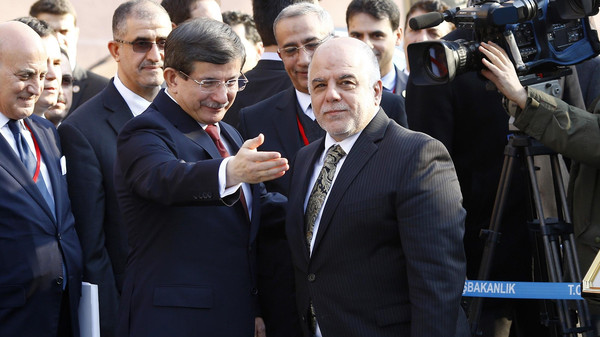
Iraq and Turkey on Thursday discussed cooperation in countering ISIS threat, including an Iraqi request for intelligence sharing and the possible delivery of Turkish arms to Iraqi forces, Iraq’s prime minister said during his visit to the neighboring country.
“We can defeat this organization by uniting all our powers, with the support of the countries in the region,” Iraqi Prime Minister Haider al-Abadi told a joint news conference with his Turkish counterpart, Ahmet Davutoglu, during his visit to the Turkish capital.
“ISIS threatens not only Iraq’s and Turkey’s security but the entire region,” Abadi said, in translated remarks.
Abadi told reporters that he had provided “lists” of things Iraq was requesting from Turkey that included military cooperation, training and delivering weapons to fighters.
Davutoglu said Turkey was already training Iraqi Kurdish Peshmerga fighters to combat the ISIS.
“We are open to any idea” to extend further support to Baghdad, he said.
Turkey and Iraq shared a “common approach to fight all terrorist organisations in the region” including ISIS and the outlawed Kurdistan Workers’ Party (PKK), Davutoglu said.
“We are ready to give any kind of support against terrorist organisations including those who have emerged in recent times like (ISIS) as well as the PKK which launches attacks against Turkey by using Iraqi soil,” he said.
Turkey has faced international criticism for letting radicals pass through its territory to fight in Syria.
Syria’s Assad
During the conference, Davutoglu insisted that the coalition must also aim to topple Syrian President Bashar al-Assad.
Ankara wants a wider strategy for Syria that would ultimately bring about Assad’s downfall.
It has repeatedly called for a buffer zone, backed by a no-fly zone, to be put in place inside the war-torn country on the Turkish border.
Davutoglu also said that Turkey opposes the presence of all foreign fighters both in Syria and in Iraq.
Abadi’s visit to Turkey follows a trip to Iraq by Davutoglu in November — in a sign of a thaw in bilateral ties which were strained in recent years over a number of issues including Ankara’s move to aid Iraqi Kurds independently export oil.





